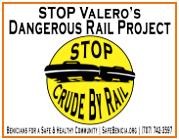Repost of an E-Alert by Benicia Mayor Elizabeth Patterson, September 18, 2016
[Editor: I would expect considerable discussion on Tuesday to center on whether to continue waiting for a Surface Transportation Board response to Valero’s end run around local permitting authority. Valero has been openly urging Council to continue to delay making a decision. City staff and the Mayor are certainly expecting a motion to delay; 3 of the 4 possible scenarios outlined below center on continuation. (Don’t miss the quote from Christopher Hart, chairperson of the National Transportation Safety Board, and Mayor Patterson’s question, at the bottom of this E-Alert.) – RS]

AN E-ALERT FROM YOUR MAYOR,
ELIZABETH PATTERSON
Benicia, California
The Tuesday Council meeting’s main item is the decision on Valero Crude by Rail EIR and Land Use Permit. The complete packet is online here.
The following are potential scenarios for action:
- Valero could submit a formal written request for continuation of the appeal in order for the Federal Surface Transportation Board to render a decision on federal preemption of local land use authority. This request would be considered under the Open Government Ordinance as “new and substantial information” and the Council would decide whether or not this request is new and substantial. If the council votes in the majority, the consideration for delay for STB decision would be on the next agenda. The council would then have to decide whether to proceed or not with the action on the current agenda which is the appeal of the Planning Commission denial of the project. Staff is recommending approving the appeal.
- No request in writing for continuation but during the council consideration of the Valero appeal, Valero could request a “point of order” and ask for council consideration of continuing the delay. Council again would have to act on the point of order before proceeding to the agenda item. There could be the same outcome as in #1.
- No request for continuation by Valero and consideration of the appeal of the denial by the Planning Commission. A councilmember could request a continuation but council cannot continue the item without Valero’s consent – so a council member could ask for a continuation and if Valero agrees the consideration of continuation would have to be at the next meeting. See #1 for steps.
- No request for continuation by anyone. The council will hear staff report – there is no public comment on this item unless there is demonstrably new and substantial information (see above for steps by council for consideration). So the decision can be as follows:
- motion and second to deny appeal and thus let stand Planning Commission denial of the land use permit with or without prejudice (with means a new application of the same project must wait one year; without means no such restriction. A modified project would be considered a new application).
- motion and second to consider certification of Final Environmental Impact Report followed by a motion to deny appeal.
- motion to certify the FEIR and grant the appeal and approve the land use permit.
“We’ve been lucky thus far that derailments involving flammable liquids in America have not yet occurred in a populated area,” Hart [current head of the National Transportation Safety Board] said. “But an American version of Lac-Mégantic could happen at any time. Instead of happening out in the middle of a wheat field it could happen in the middle of a big city.” The Bakken oil train explosion in Lac-Mégantic, Quebec, Canada, killed 47 people. As these safety issues are ignored, dismissed, or continued to be studied, an important question remains: How long until that luck runs out?

 Yesterday, the City of Benicia released its
Yesterday, the City of Benicia released its  Sorry, I had to take a little break. When the Benicia City Council voted 3-2 to put off a decision on Valero’s crude by rail proposal (CBR), it was just a bit too much.
Sorry, I had to take a little break. When the Benicia City Council voted 3-2 to put off a decision on Valero’s crude by rail proposal (CBR), it was just a bit too much. Valero’s refinery, its stacks and cooling towers visible for miles, spreads across the northern edge of Benicia, a riverside town of 28,000 in Solano County. Valero is the source of jobs and a significant portion of the city’s tax base. Yet, drive through the streets and you will see “Stop Crude by Rail” signs everywhere.
Valero’s refinery, its stacks and cooling towers visible for miles, spreads across the northern edge of Benicia, a riverside town of 28,000 in Solano County. Valero is the source of jobs and a significant portion of the city’s tax base. Yet, drive through the streets and you will see “Stop Crude by Rail” signs everywhere.
You must be logged in to post a comment.